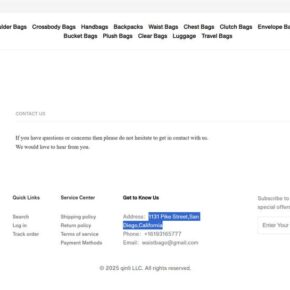Scam emails have become an unfortunate reality in today’s digital age. One prevalent type of scam email is the ‘National Lottery’ scam, which preys on individuals’ hopes of winning a large sum of money. These deceptive emails often appear legitimate, using the branding and logos of well-known lottery organizations to trick recipients into believing they have won a substantial prize. In this article, we will delve into the details of ‘National Lottery’ scam emails, how they work, what to do if you have fallen victim, and provide valuable insights to help protect yourself from falling prey to these scams.

What are ‘National Lottery’ Scam Emails?
‘National Lottery’ scam emails are fraudulent messages that claim the recipient has won a substantial amount of money in a lottery. These emails often mimic the branding and logos of well-known lottery organizations, such as the UK National Lottery or the Powerball in the United States, to appear legitimate. The scammers behind these emails use various tactics to convince recipients of their supposed winnings, including fake lottery ticket numbers, official-looking documents, and even the names of real lottery winners.
How the Scam Works
The ‘National Lottery’ scam typically begins with an unsolicited email that informs the recipient of their supposed lottery win. The email may congratulate the recipient and provide details of the prize amount, claiming it to be a substantial sum of money. To further convince the recipient, the scammers may include official-looking documents, such as a certificate of authenticity or a letter from a lottery official.
Once the recipient believes they have won the lottery, the scammers will then request personal information, such as full name, address, phone number, and bank account details, under the guise of needing this information to process the prize claim. Unbeknownst to the recipient, providing this information can lead to identity theft or financial fraud.
In some cases, the scammers may also request an upfront payment or fee to cover administrative costs or taxes associated with the prize. They may pressure the recipient to make the payment quickly, using tactics such as claiming the prize will be forfeited if the payment is not made promptly.
What to Do if You Have Fallen Victim
Discovering that you have fallen victim to a ‘National Lottery’ scam can be distressing, but it is important to take immediate action to minimize the potential damage. Here are the steps you should take if you have fallen victim to such a scam:
- Contact your local authorities: Report the scam to your local law enforcement agency. Provide them with all the details of the scam, including any emails or documents you received.
- Notify your bank: If you have provided your bank account details to the scammers, contact your bank immediately. Inform them of the situation and follow their guidance on securing your account.
- Monitor your accounts: Keep a close eye on your bank accounts, credit cards, and any other financial accounts for any suspicious activity. If you notice any unauthorized transactions, report them to your bank or financial institution right away.
- Change your passwords: As a precautionary measure, change the passwords for all your online accounts, including email, banking, and social media. Use strong, unique passwords to enhance your security.
- Run a scan with Malwarebytes: Scammers often use malware or viruses to gain access to personal information. To ensure your computer is free from any malicious software, run a scan with Malwarebytes Free or any reputable antivirus software.
Technical Details of ‘National Lottery’ Scam Emails
‘National Lottery’ scam emails employ various techniques to appear legitimate and deceive recipients. Here are some technical details to be aware of:
- Phishing links: Scammers may include links in the email that direct recipients to fake websites designed to collect personal information. These websites often mimic the official lottery organization’s website, making it difficult to distinguish between the real and fake sites.
- Spoofed email addresses: The scammers may use email addresses that appear similar to the official lottery organization’s email address, but with slight variations. For example, they may replace a letter with a similar-looking character or add extra characters to the domain name.
- Malicious attachments: Some scam emails may contain attachments that, when opened, install malware or viruses on the recipient’s computer. These malicious programs can then be used to steal personal information or gain unauthorized access to the victim’s system.
Statistics on ‘National Lottery’ Scam Emails
While it is challenging to obtain accurate statistics on ‘National Lottery’ scam emails due to underreporting, the prevalence of these scams is evident. Here are some statistics that shed light on the scale of the issue:
- In 2020, the UK National Lottery reported that they received over 1,000 reports of scam emails impersonating their organization.
- The Federal Trade Commission (FTC) in the United States received over 1,400 reports of lottery scams in 2020, with reported losses exceeding $3 million.
- A study conducted by cybersecurity firm Symantec found that lottery scams accounted for 2% of all spam emails in 2020.
Summary
‘National Lottery’ scam emails are a prevalent form of online fraud that exploit individuals’ desire to win a large sum of money. These deceptive emails mimic the branding of well-known lottery organizations and trick recipients into believing they have won a prize. To protect yourself from falling victim to these scams, it is crucial to be vigilant and skeptical of unsolicited emails claiming lottery winnings. If you have fallen victim, take immediate action by reporting the scam, notifying your bank, monitoring your accounts, changing passwords, and running a scan with Malwarebytes. By staying informed and taking proactive measures, you can reduce the risk of becoming a victim of ‘National Lottery’ scam emails.

![Remove Spolanamph.com Pop-up Ads [Virus Removal Guide] 3 McAfee scam 4](https://malwaretips.com/blogs/wp-content/uploads/2023/08/McAfee-scam-4-290x290.jpg)


